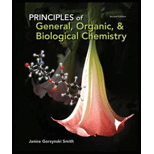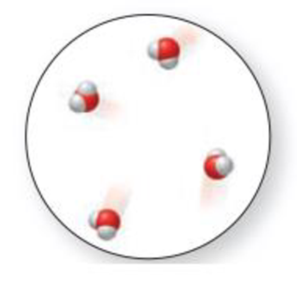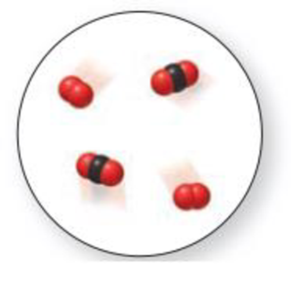
Principles of General, Organic, Biological Chemistry
2nd Edition
ISBN: 9780073511191
Author: Janice Gorzynski Smith Dr.
Publisher: McGraw-Hill Education
expand_more
expand_more
format_list_bulleted
Concept explainers
Textbook Question
Chapter 1.3, Problem 1.4P
Classify each example of molecular art as a pure substance or a mixture:


Expert Solution & Answer
Want to see the full answer?
Check out a sample textbook solution
Students have asked these similar questions
Predicting
edict the major products of this organic reaction.
If there aren't any products, because nothing will happen, check the box under the drawing area instead.
+
No reaction.
Explanation
Check
HO
Na O H
xs H₂O
2
Click and drag to start
drawing a structure.
© 2025 McGraw Hill LLC. All Rights Reserved. Terms of Use | Privacy Center I
Choosing reagents and conditions for acetal formation or hydrolysis
0/5
A student proposes the transformation below in one step of an organic synthesis. There may be one or more products missing from
the right-hand side, but there are no reagents missing from the left-hand side. There may also be catalysts, small inorganic
reagents, and other important reaction conditions missing from the arrow.
• Is the student's transformation possible? If not, check the box under the drawing area.
If the student's transformation is possible, then complete the reaction by adding any missing products to the right-hand side,
and adding required catalysts, inorganic reagents, or other important reaction conditions above and below the arrow.
• You do not need to balance the reaction, but be sure every important organic reactant or product is shown.
+
This transformation can't be done in one step.
5
I
H
Autumn
alo
值
Ar
B
A block of copper of mass
2.00kg(cp
= 0.3851
.K) and
g
temperature 0°C is introduced into
an insulated container in which there
is 1.00molH, O(g) at 100°C and 1.00
2
atm. Note that
C
P
= 4.184. K for liquid water, and
g
that A
H = 2260 for water.
vap
g
Assuming all the steam is condensed
to water, and that the pressure
remains constant:
(a) What will be the final temperature
of the system?
(b) What is the heat transferred from
the water to the copper?
(c) What is the entropy change of the
water, the copper, and the total
system?
Chapter 1 Solutions
Principles of General, Organic, Biological Chemistry
Ch. 1.1 - Imagine that your job as a healthcare professional...Ch. 1.2 - Characterize each process as a physical change or...Ch. 1.2 - Does the molecular art represent a chemical change...Ch. 1.3 - Classify each example of molecular art as a pure...Ch. 1.3 - Prob. 1.5PCh. 1.3 - Classify each item as an element or a compound:...Ch. 1.4 - Prob. 1.7PCh. 1.4 - If a nanometer is one billionth of a meter (0.000...Ch. 1.4 - Prob. 1.9PCh. 1.4 - Prob. 1.10P
Ch. 1.5 - How many significant figures does each number...Ch. 1.5 - Indicate whether each zero in the following...Ch. 1.5 - Prob. 1.13PCh. 1.5 - Carry out each calculation and give the answer...Ch. 1.5 - Prob. 1.15PCh. 1.6 - Prob. 1.16PCh. 1.6 - Prob. 1.17PCh. 1.6 - Prob. 1.18PCh. 1.7 - Prob. 1.19PCh. 1.7 - Prob. 1.20PCh. 1.7 - Prob. 1.21PCh. 1.7 - Carry out each of the following conversions. a....Ch. 1.8 - Prob. 1.23PCh. 1.8 - A patient is prescribed 0.100 mg of a drug that is...Ch. 1.8 - Prob. 1.25PCh. 1.9 - Prob. 1.26PCh. 1.9 - Prob. 1.27PCh. 1.10 - How does the mass of liquid A in cylinder [1]...Ch. 1.10 - Prob. 1.29PCh. 1.10 - Prob. 1.30PCh. 1 - Classify each example of molecular art as a pure...Ch. 1 - (a) Which representation(s) in Problem 1.31...Ch. 1 - When a chunk of dry ice (solid carbon dioxide) is...Ch. 1 - The inexpensive preparation of nitrogen-containing...Ch. 1 - a. What is the temperature on the given Fahrenheit...Ch. 1 - (a) What is the length of the given crayon in...Ch. 1 - Prob. 1.37UKCCh. 1 - Prob. 1.38UKCCh. 1 - Prob. 1.39UKCCh. 1 - Red light has a wavelength of 683 nm. Convert this...Ch. 1 - Prob. 1.41UKCCh. 1 - Prob. 1.42UKCCh. 1 - Prob. 1.43UKCCh. 1 - Prob. 1.44UKCCh. 1 - Label each component in the molecular art as an...Ch. 1 - Label each component in the molecular art as an...Ch. 1 - Describe solids, liquids, and gases in terms of...Ch. 1 - Prob. 1.48APCh. 1 - Prob. 1.49APCh. 1 - Classify each process as a chemical or physical...Ch. 1 - Which quantity in each pair is larger? a. 5 mL or...Ch. 1 - Which quantity in each pair is larger? a. 10 km or...Ch. 1 - Label each quantity as an exact or inexact number....Ch. 1 - Rank the quantities in each group from smallest to...Ch. 1 - How many significant figures does each number...Ch. 1 - Prob. 1.56APCh. 1 - Round each number to three significant figures. a....Ch. 1 - Prob. 1.58APCh. 1 - Prob. 1.59APCh. 1 - Prob. 1.60APCh. 1 - Prob. 1.61APCh. 1 - Prob. 1.62APCh. 1 - Prob. 1.63APCh. 1 - Prob. 1.64APCh. 1 - Prob. 1.65APCh. 1 - Rank the numbers in each group from smallest to...Ch. 1 - Write the recommended daily intake of each...Ch. 1 - Prob. 1.68APCh. 1 - Prob. 1.69APCh. 1 - Carry out each of the following conversions. a. 25...Ch. 1 - Prob. 1.71APCh. 1 - Prob. 1.72APCh. 1 - Prob. 1.73APCh. 1 - Prob. 1.74APCh. 1 - Prob. 1.75APCh. 1 - Prob. 1.76APCh. 1 - Prob. 1.77APCh. 1 - Prob. 1.78APCh. 1 - Prob. 1.79APCh. 1 - Prob. 1.80APCh. 1 - Prob. 1.81APCh. 1 - Prob. 1.82APCh. 1 - Which is the upper layer when each of the...Ch. 1 - Prob. 1.84APCh. 1 - A lab test showed an individuals cholesterol level...Ch. 1 - Prob. 1.86APCh. 1 - Liposuction is a cosmetic procedure used to remove...Ch. 1 - Prob. 1.88APCh. 1 - Prob. 1.89APCh. 1 - Prob. 1.90APCh. 1 - Prob. 1.91APCh. 1 - Prob. 1.92APCh. 1 - Prob. 1.93CPCh. 1 - Prob. 1.94CPCh. 1 - Prob. 1.95CPCh. 1 - Prob. 1.96CPCh. 1 - A soccer player weighed 70.7 kg before a match,...Ch. 1 - Prob. 1.98CP
Knowledge Booster
Learn more about
Need a deep-dive on the concept behind this application? Look no further. Learn more about this topic, chemistry and related others by exploring similar questions and additional content below.Similar questions
- Identify the missing organic reactants in the following reaction: H+ X + Y OH H+ O O Note: This chemical equation only focuses on the important organic molecules in the reaction. Additional inorganic or small-molecule reactants or products (like H₂O) are not shown. In the drawing area below, draw the skeletal ("line") structures of the missing organic reactants X and Y. You may draw the structures in any arrangement that you like, so long as they aren't touching. Explanation Check Click and drag to start drawing a structure. X G 2025 McGraw Hill LLC. All Rights Reserved. Terms of Use | Privacy Cente ? Earrow_forwardCalculate the solubility of CaF2 in g/L (Kp = 4.0 x 10-8). sparrow_forwardFor the following reaction with excess reagent, predict the product. Be sure your answer accounts for stereochemistry. If multiple stereocenters are formed, be sure to draw all products using appropriate wedges and dashes. 1. EtLi, Et₂O CH₁ ? 2. H₂O*arrow_forward
- Write the systematic name of each organic molecule: structure 요 OH ہو۔ HO OH name X S ☐ ☐arrow_forwardPredict the major products of this organic reaction. If there aren't any products, because nothing will happen, check the box under the drawing area instead. D ㄖˋ ید H No reaction. + 5 H₂O.* Click and drag to start drawing a structure. OH H₂Oarrow_forwardDraw one product of an elimination reaction between the molecules below. Note: There may be several correct answers. You only need to draw one of them. You do not need to draw any of the side products of the reaction 'O 10 + x 也 HO + 义 Click and drag to start drawing a structure.arrow_forward
- What are the angles a and b in the actual molecule of which this is a Lewis structure? H- :0: C=N: b Note for advanced students: give the ideal angles, and don't worry about small differences from the ideal that might be caused by the fact that different electron groups may have slightly different sizes. a = 0° b=0 Xarrow_forwardA student proposes the transformation below in one step of an organic synthesis. There may be one or more products missing from the right-hand side, but there are no reagents missing from the left-hand side. There may also be catalysts, small inorganic reagents, and other important reaction conditions missing from the arrow. • Is the student's transformation possible? If not, check the box under the drawing area. • If the student's transformation is possible, then complete the reaction by adding any missing products to the right-hand side, and adding required catalysts, inorganic reagents, or other important reaction conditions above and below the arrow. • You do not need to balance the reaction, but be sure every important organic reactant or product is shown. + This transformation can't be done in one step. T iarrow_forwardDetermine the structures of the missing organic molecules in the following reaction: H+ O OH H+ + H₂O ☑ ☑ Note: Molecules that share the same letter have the exact same structure. In the drawing area below, draw the skeletal ("line") structure of the missing organic molecule X. Molecule X shows up in multiple steps, but you only have to draw its structure once. Click and drag to start drawing a structure. X § ©arrow_forward
- Table 1.1 Stock Standard Solutions Preparation. The amounts shown should be dissolved in 100 mL. Millipore water. Calculate the corresponding anion concentrations based on the actual weights of the reagents. Anion Amount of reagent (g) Anion Concentration (mg/L) 0.1649 Reagent Chloride NaCl Fluoride NaF 0.2210 Bromide NaBr 0.1288 Nitrate NaNO3 0.1371 Nitrite NaNO2 0.1500 Phosphate KH2PO4 0.1433 Sulfate K2SO4 0.1814arrow_forwardDraw the structure of the pound in the provided CO as a 300-1200 37(2), 11 ( 110, and 2.5 (20arrow_forwardPlease help me with # 4 and 5. Thanks in advance!arrow_forward
arrow_back_ios
SEE MORE QUESTIONS
arrow_forward_ios
Recommended textbooks for you
- Chemistry: Matter and ChangeChemistryISBN:9780078746376Author:Dinah Zike, Laurel Dingrando, Nicholas Hainen, Cheryl WistromPublisher:Glencoe/McGraw-Hill School Pub Co

 Introductory Chemistry: A FoundationChemistryISBN:9781337399425Author:Steven S. Zumdahl, Donald J. DeCostePublisher:Cengage Learning
Introductory Chemistry: A FoundationChemistryISBN:9781337399425Author:Steven S. Zumdahl, Donald J. DeCostePublisher:Cengage Learning  World of Chemistry, 3rd editionChemistryISBN:9781133109655Author:Steven S. Zumdahl, Susan L. Zumdahl, Donald J. DeCostePublisher:Brooks / Cole / Cengage Learning
World of Chemistry, 3rd editionChemistryISBN:9781133109655Author:Steven S. Zumdahl, Susan L. Zumdahl, Donald J. DeCostePublisher:Brooks / Cole / Cengage Learning Chemistry for Today: General, Organic, and Bioche...ChemistryISBN:9781305960060Author:Spencer L. Seager, Michael R. Slabaugh, Maren S. HansenPublisher:Cengage Learning
Chemistry for Today: General, Organic, and Bioche...ChemistryISBN:9781305960060Author:Spencer L. Seager, Michael R. Slabaugh, Maren S. HansenPublisher:Cengage Learning

Chemistry: Matter and Change
Chemistry
ISBN:9780078746376
Author:Dinah Zike, Laurel Dingrando, Nicholas Hainen, Cheryl Wistrom
Publisher:Glencoe/McGraw-Hill School Pub Co


Introductory Chemistry: A Foundation
Chemistry
ISBN:9781337399425
Author:Steven S. Zumdahl, Donald J. DeCoste
Publisher:Cengage Learning

World of Chemistry, 3rd edition
Chemistry
ISBN:9781133109655
Author:Steven S. Zumdahl, Susan L. Zumdahl, Donald J. DeCoste
Publisher:Brooks / Cole / Cengage Learning


Chemistry for Today: General, Organic, and Bioche...
Chemistry
ISBN:9781305960060
Author:Spencer L. Seager, Michael R. Slabaugh, Maren S. Hansen
Publisher:Cengage Learning
Types of Matter: Elements, Compounds and Mixtures; Author: Professor Dave Explains;https://www.youtube.com/watch?v=dggHWvFJ8Xs;License: Standard YouTube License, CC-BY